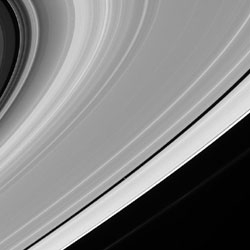
Sweeping view of Saturn’s rings. Image credit: NASA/JPL/SSI. Click to enlarge.
A grandiose gesture of gravity, Saturn’s icy rings fan out across many thousands of kilometers of space. The moon Pan (26 kilometers, or 16 miles across) dutifully follows its path, like the billions and billions of particles comprising the rings. The little moon is seen at the center of this view, within the Encke gap.
The famous Cassini Division spans upper left corner of the scene. The Cassini Division is approximately 4,800-kilometers-wide (2,980 miles) and is visible in small telescopes from Earth.
The narrow, knotted F ring is thinly visible just beyond the main rings.
The image was taken in visible light with the Cassini spacecraft narrow-angle camera on July 20, 2005, at a distance of approximately 2.1 million kilometers (1.3 million miles) from Saturn. The image scale on Pan is 13 kilometers (8 miles) per pixel.
The Cassini-Huygens mission is a cooperative project of NASA, the European Space Agency and the Italian Space Agency. The Jet Propulsion Laboratory, a division of the California Institute of Technology in Pasadena, manages the mission for NASA’s Science Mission Directorate, Washington, D.C. The Cassini orbiter and its two onboard cameras were designed, developed and assembled at JPL. The imaging operations center is based at the Space Science Institute in Boulder, Colo.
For more information about the Cassini-Huygens mission visit http://saturn.jpl.nasa.gov . The Cassini imaging team homepage is at http://ciclops.org .
Original Source: NASA/JPL/SSI News Release
